#john mcdaniel's broadway series
Explore tagged Tumblr posts
Text
allisonstuller: Because I love you. They weren’t together at the piano so I had to choose and watching his little faces when he looked at her won most of the time 😂
#darren criss#mia swier#john mcdaniel's broadway series#darren criss with john mcdaniel#darren criss with john mcdaniel after party#twitter#video#july 2024
57 notes
·
View notes
Text




DARREN & MIA CRISS Double Printed Tiger Blouse - $22.02 The Kooples Sport Women's Shirt White With Printed Animal Size S -£33.00 - Mia's snapchat | October 21, 2016 - Broadway and Vine's Concert | July 25, 2024 | 📷 Devika Maya
#tiger#shirt#sharing clothes#lip off the sleeve#darren criss#mia swier#dc fashion#my edits#broadway and vine's 2024 concert#john mcdaniel's broadway series#darren criss with john mcdaniel#boat slip#tea dance#10212016
7 notes
·
View notes
Text
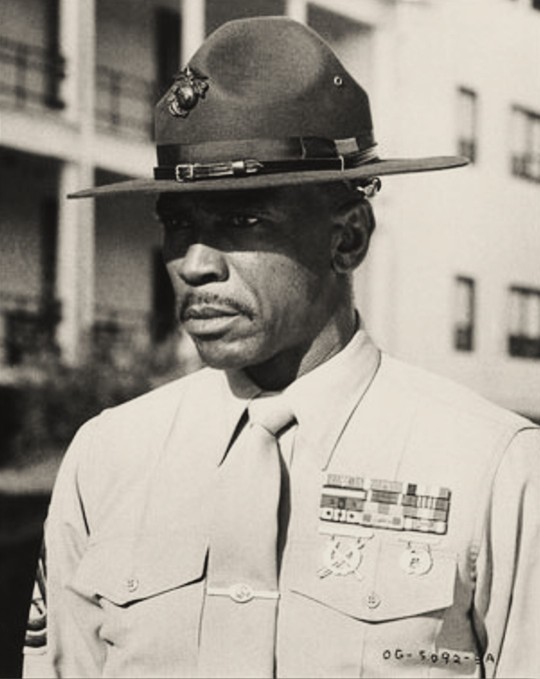
The actor Lou Gossett Jr, who has died aged 87, is best known for his performance in An Officer and A Gentleman (1982) as Gunnery Sergeant Emil Foley, whose tough training transforms recruit Richard Gere into the man of the film’s title. He was the first black winner of an Academy Award for best supporting actor, and only the third black actor (after Hattie McDaniel and Sidney Poitier) to take home any Oscar.
The director, Taylor Hackford, said he cast Gossett in a role written for a white actor, following a familiar Hollywood trope played by John Wayne, Burt Lancaster, Victor McLaglen or R Lee Ermey, because while researching he realised the tension of “black enlisted men having make-or-break control over whether white college graduates would become officers”. Gossett had already won an Emmy award playing a different sort of mentor, the slave Fiddler who teaches Kunta Kinte the ropes in Roots (1977), but he was still a relatively unknown 46-year-old when he got his breakthrough role, despite a long history of success on stage and in music as well as on screen.
Born in Sheepshead Bay, Brooklyn, Louis was the son of Helen (nee Wray), a nurse, and Louis Sr, a porter. As a child he suffered from polio, but became a high school athlete before a basketball injury led to his joining the drama club. His teacher encouraged him to audition professionally, and at 17 he was on Broadway playing a troubled child in Take a Giant Step, which won him a Donaldson award for best newcomer.
He won a drama scholarship to New York University, but continued working, in The Desk Set (1955), and made his television debut in two episodes of the NBC anthology show The Big Story. In 1959 he was cast with Poitier and Ruby Dee in Raisin in the Sun, and made his film debut reprising his role in 1961. On Broadway that year he played in Jean Genet’s The Blacks, in an all-star cast with James Earl Jones, Cicely Tyson, Roscoe Lee Brown, Godfrey Cambridge and a young Maya Angelou; it was the decade’s longest-running show.
Gossett was also active in the Greenwich Village folk music scene. He released his first single Hooka Dooka, Green Green in 1964, followed by See See Rider, and co-wrote the anti-war hit Handsome Johnny with Richie Havens. In 1967 he released another single, a drums and horns version of Pete Seeger’s anti-war hymn Where Have All the Flowers Gone. He was in the gospel musical Tambourines to Glory (1963) and in producer Mike Todd’s America, Be Seated at the 1964 New York World’s Fair.
His plays became more limited: The Zulu and the Zayda and My Sweet Charlie; the very short run of Carry Me Back to Morningside Heights, in which he played a black man owning a white slave; and a revival of Golden Boy (1964), with Sammy Davis Jr. His final Broadway part was as the murdered Congolese leader Patrice Lamumba, in Conor Cruise O’Brien’s Murderous Angels (1971). Gossett had played roles in New York-set TV series such as The Naked City, but he began to make a mark in Hollywood, despite LAPD officers having handcuffed him to a tree, on “suspicion”, in 1966.
On TV he starred in The Young Rebels (1970-71) set in the American revolution. In film, he was good as a desperate tenant in Hal Ashby’s Landlord (1970) and brilliant with James Garner in Skin Game (1971), taking part in a con trick in which Garner sells him repeatedly into slavery then helps him to escape.
In 1977, alongside Roots, he attracted attention as a memorable villain in Peter Yates’s hit The Deep, and got artistic revenge on the LAPD in Robert Aldrich’s The Choirboys. The TV movie of The Lazarus Syndrome (1979) became a series in which Gossett played a realistic hospital chief of staff set against an idealistic younger doctor. He played the black baseball star Satchel Paige in the TV movie Don’t Look Back (1981); years later he had a small part as another Negro League star, Cool Papa Bell, in The Perfect Game (2009).
After his Oscar, he played another assassinated African leader, in the TV mini-series Sadat, reportedly approved for the role by Anwar Sadat’s widow Jihan. Though he remained a busy working actor, good starring roles in major productions eluded him, as producers fell back on his drill sergeant image. He was Colonel “Chappy” Sinclair in Iron Eagle (1986) and its three dismal sequels.
But in 1989 he starred in Dick Wolf’s TV series Gideon Oliver, as an anthropology professor solving crimes in New York. And he won a best supporting actor Golden Globe for his role in the TV movie The Josephine Baker Story (1991). He revisited the stage in the film adaptation of Sam Shepard’s Curse of the Starving Class (1994).
Gossett twice received the NAACP’s Image Award, and another Emmy for producing a children’s special, In His Father’s Shoes (1997). In 2006 he founded the Eracism Foundation, providing programmes to foster “cultural diversity, historical enrichment and anti-violence initiatives”. Despite an illness eventually linked to toxic mould in his Santa Monica home, he kept working with a recurring part in Stargate SG-1 (2005-06). A diagnosis of prostate cancer in 2010 hardly slowed him down.
Most recently, he played Will “Hooded Justice” Reeves in the TV series Watchmen (2019), in the series Kingdom Business, about the gospel music industry, and in the 2023 musical remake of The Color Purple.
His first marriage, to Hattie Glascoe, in 1967, was annulled after five months; his second, to Christina Mangosing, lasted for two years from 1973; and his third, to Cyndi (Cynthia) James, from 1987 to 1992. He is survived by two sons, Satie, from his second marriage, and Sharron, from his third.
🔔 Louis Cameron Gossett Jr, actor, born 27 May 1936; died 28 March 2024
Daily inspiration. Discover more photos at Just for Books…?
22 notes
·
View notes
Text
How Sondheim and Burnett Got Darren Criss to Provincetown
The songwriter and star of Glee makes his local debut in Broadway-centric concert
By Kathi Scrizzi Driscoll Jul 17, 2024
Provincetown hasn’t been compared to The Godfather or Star Wars very often, but those are the examples actor and singer Darren Criss names in acknowledging that his July 21 town hall appearance will be his first visit here.
“Provincetown is like that movie that you haven’t seen but you don’t want your friends to know you haven’t seen, so you don’t incur their wrath and ridicule and disbelief,” he says, noting that several of his good pals visit often. “I don’t bring up that I haven’t been there because my friends will give me crap. I haven’t avoided it — I’ve really wanted to go. Finally, the stars aligned quite nicely.”
Maybe the stars had a little help from Carol Burnett.
Host and accompanist John McDaniel, a Grammy and Emmy award-winning musician, says he invited Criss to be part of his summer Broadway series here after Criss performed on 2023’s Carol Burnett: 90 Years of Love + Laughter TV birthday special. McDaniel was the music director.
Criss’s best-known roles are his breakout portrayal of Blaine for five seasons (2010 to 2015) on Glee in a milestone-for-mainstream-TV gay romance with Chris Colfer’s Kurt, and his 2018 Emmy- and Golden Globe-winning turn as spree killer Andrew Cunanan in The Assassination of Gianni Versace: American Crime Story. (Both roles came thanks to producer and Provincetown part-timer Ryan Murphy.)
In addition to acting and singing — including Glee’s “Teenage Dream” cover that climbed the Billboard charts — Criss is a songwriter. He first won notice for co-writing and starring in 2009’s A Very Potter Musical parody for the Chicago-based StarKid Productions, which he co-founded. Criss’s A Very Darren Crissmas generated national holiday tours.
Shortly after Criss wrote the opening number for the 2022 Tony Awards, his friend Paul Miller, director of the Burnett tribute, asked him to refashion Stephen Sondheim’s “Side by Side” from Company into an homage to Burnett’s famous duets with celebrity guest stars.
In what he called “one of the coolest things I’ve ever gotten to be a part of,” Criss performed “Burnett’s Duets” for the star-studded birthday-party special with Broadway’s Sutton Foster. That came after he meticulously dissected Sondheim’s music to fit new lyrics and fine-tuned the arrangement with McDaniel.
“When I was doing this,” Criss says, “in my mind, I was going, ‘What would the ghost of Sondheim be OK with?’ ”
More Broadway music will be on Criss’s mind in Provincetown for what he says will be an unusual program because it likely won’t include original work or him playing guitar or piano; McDaniel will accompany him. Criss prides himself on not performing the same live show twice and plans to include Broadway songs he’s not yet sung in public.
That said, he recognizes fans might want to hear something connected to his own Broadway star turns. Those include — besides the nonmusical American Buffalo in 2022 — How to Succeed in Business Without Really Trying in 2012 and 2015’s Hedwig and the Angry Inch. Plus, earlier this year, Criss starred in off-Broadway’s Little Shop of Horrors.
In September, he’ll originate a Broadway role for the first time, headlining Will Aronson and Hue Park’s musical Maybe Happy Ending. Criss plays an outdated, retired robot in futuristic Seoul who explores the nature of love with another retired robot (Helen J. Shen). To try to help boost its U.S. profile, Criss is also a producer of the musical, which has been a hit in Korea, China, and Japan. Its Broadway debut will be directed by Michael Arden (2023 Tony Award for Parade, Spring Awakening), a longtime Criss friend who directed the English-language debut in 2020 in Atlanta.
Criss is excited but nervous about the piece; he says it’s intimate and epic at once. “There’s an excitement about the uniqueness and specialness of this show that I’ve never encountered before,” he says. “So that’s either going to crash and burn and blow up in our faces or catch on. I don’t know, but the prospect is very thrilling.”
Criss, who is straight, made headlines this spring for comments at a Chicago expo about being “culturally queer” because of his admiration for the LGBTQ community. “The things in my life that I have tried to emulate, learn from, and be inspired by are 100 percent queer,” he said then, later adding that “it was in queer communities that I’ve found people that I idolize, that I want to learn something from.”
“That had to be the slowest news day ever,” Criss says about his comments getting attention — especially because he’s talked many times before about similar things, including how much it meant to be part of Glee’s Blaine-Kurt relationship story.
Beyond Provincetown and Broadway, in August Criss’s voice will be heard in an unusual spot: on season 10 of Netflix’s Gabby’s Dollhouse, a children’s show, as the new Marty the Party Cat, magical host of the Party Room. It’s a voice role Criss says was planned long before his two-year-old daughter and seven-week-old son were born to him and his wife.
Marty is described by Netflix as a lovable, “exuberant goofball” who has a big heart and the ability to laugh at himself.
“He’s a fun guy,” Criss says. “I’m aspirationally Marty the Party Cat.”
5 notes
·
View notes
Text
2 notes
·
View notes
Text
DARREN CRISS WITH JOHN MCDANIEL Online sale ends 7/21/24 8:00pm EDT
Sunday, Jul 21st, 2024 Starts at 8:30PM EDT
PROVINCETOWN TOWN HALL 260 COMMERCIAL STREET PROVINCETOWN, MA 02657
0 notes
Text
GEORGE REEVES
January 5, 1914
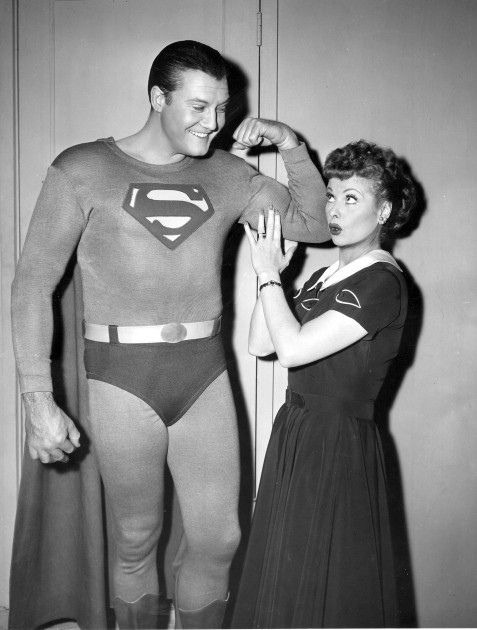
George Reeves was born George Keefer Brewer in Woolstock, Iowa. He is best known for his role as Superman in the television program “Adventures of Superman” (1952-58). His birth date is often listed as April 5, 1914, but that was born only five months after his parents' wedding and it was not until adulthood that he learned the truth. To further confuse matters, his mother made a mistake when having the urn containing his ashes inscribed and it reads January 6 instead of January 5.
Reeves began acting and singing in high school and continued performing on stage as a student at Pasadena Junior College.
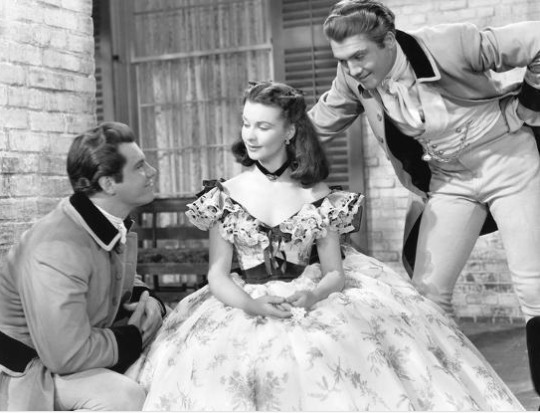
Reeves's film career took off in 1939 when he was cast as Stuart Tarleton (incorrectly listed in the film's credits as Brent Tarleton), one of Scarlett O'Hara's suitors (with Fred Crane, above left) in Gone with the Wind. Reeves dyed his hair red to portray one of the Tarleton twins. Lucille Ball read for the role of Scarlet O’Hara, one of hundreds of Hollywood starlets that vied for the role. References to the novel and iconic film can be found throughout her sitcoms. Had she gotten the part, she would have been in the film with her future “I Love Lucy” actors Olin Howland, Irving Bacon, Alberto Morin, Shep Houghton, Ralph Brooks, and Hans Moebus. Sam McDaniel, brother of Mammy portrayer Hattie McDaniel, would be the first and only person of color to speak on “I Love Lucy” as the Porter in “The Great Train Robbery” (ILL S5;E5). Lucille Ball would one day own the back lot where the movie was filmed!
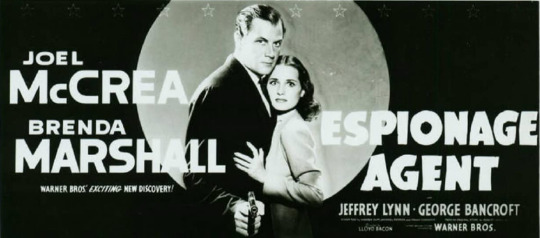
Although Gone With the Wind was his first credited role in a feature film, a Warner Brothers short film titled Ride, Cowboy, Ride and the feature Espionage Agent were actually released three months earlier.
While studying acting at the Pasadena Playhouse in 1940, Reeves married Ellanora Needles, granddaughter of circus magnate John Robinson. They had no children and divorced 10 years later.
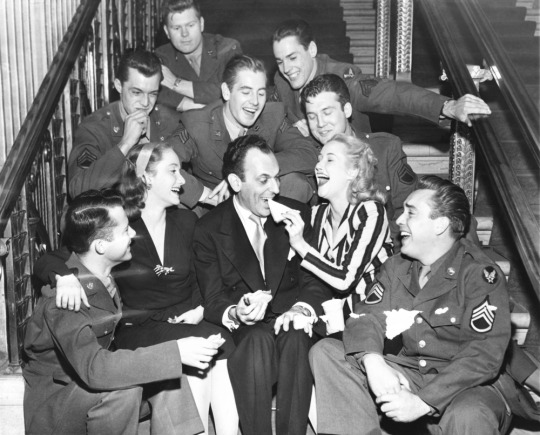
Before his television fame as Superman, Reeves enlisted in the US Army and appeared on Broadway in Winged Victory (1943) by Moss Hart (center). The cast featured actual service members, including Sergeant George Reeves (above, behind Phyllis Avery). He also appeared in the film version.
Reeves made his television debut on September 29, 1949 in an episode (now lost) of the suspense anthology series “The Clock.” Three weeks later he appeared in a second episode.
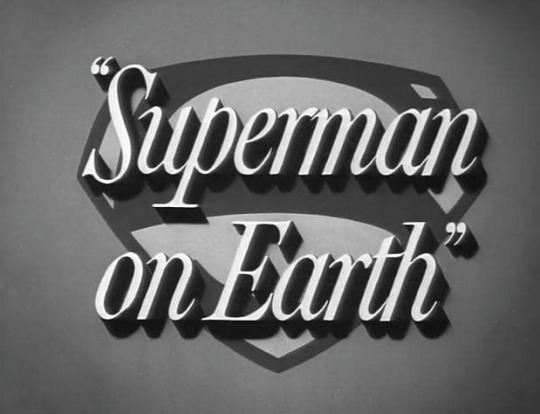
His first episode of “Adventures of Superman” was “Superman on Earth” aired on September 19, 1952. Ross Elliott, who played Ricky Ricardo’s Press Agent on “I Love Lucy”, was cast as Jor-El, Superman’s father, but was replaced by Robert Rockwell, famous for playing Mr. Boynton on “Our Miss Brooks”. Strangely, Elliott still receives screen credit. This first “Superman” also features Dani Sue Nolan, who was the wife of “I Love Lucy” director William Asher. Ironically, Asher did not direct the episode of “I Love Lucy” starring Reeves, which was staged by James V. Kern.
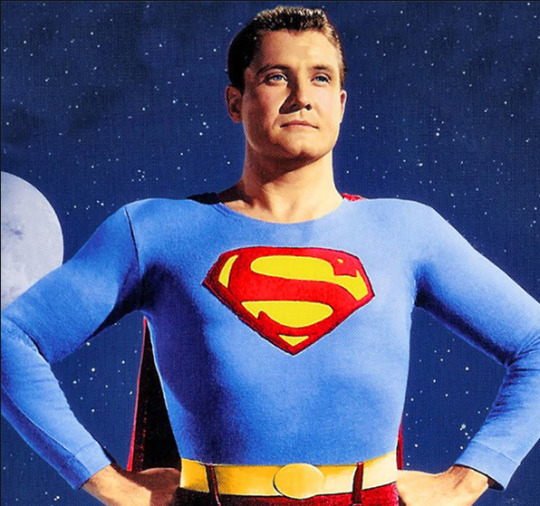
Reeves appeared in all 104 episodes over 6 seasons of the ABC TV series.
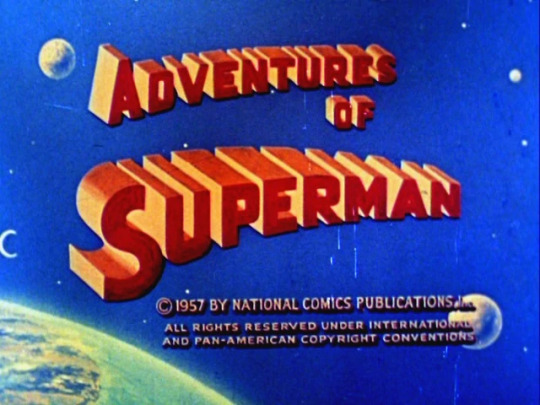
Initially shot and aired in black and white, the series (like “The Lucy Show”) was filmed in color starting with season 3. The first 26 episodes were filmed in 1951, the same year “I Love Lucy” started airing, but did not appear on television until 1952, when Kellogg's Cereals agreed to sponsor the show. Reeves was 44 years old during the filming of the sixth and final season, making him the oldest actor to have ever played Clark Kent / Superman in live-action. Although the Superman costume was padded to make it appear that Reeves had greater bulk, he did most of his own stunts. The first season of the series was shot on the 40 Acres back lot that was part of RKO / Desilu Studios.
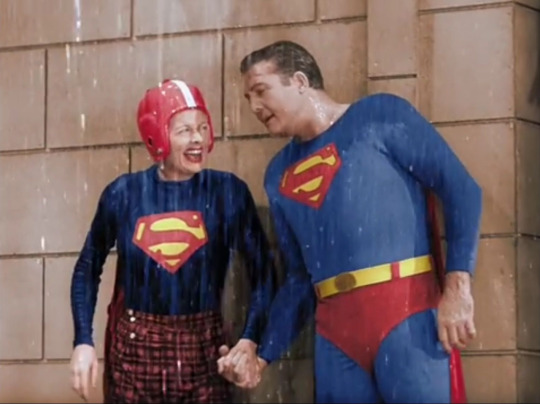
On November 15, 1956, Reeves filmed the now-iconic “I Love Lucy” episode “Lucy and Superman” (ILL S6;E13), which premiered on January 14, 1957. The episode was colorized on May 17, 2015.
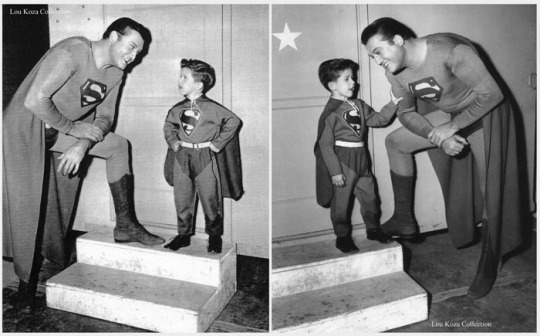
Keith Thibodeaux (Little Ricky) has said that this was his favorite episode of the series. He later talked about meeting Reeves...
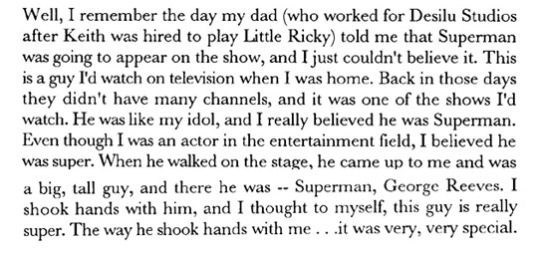
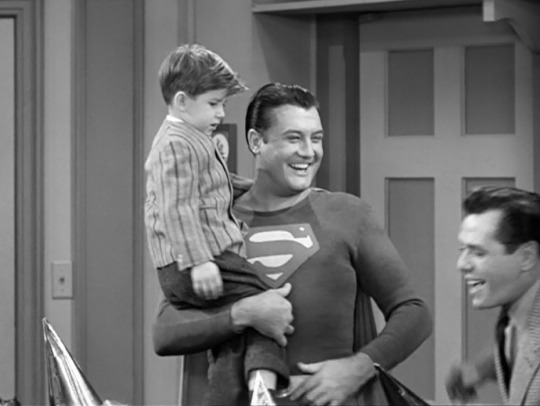
Reeves is never mentioned by name in the dialogue or in the original credits. Lucie Arnaz later theorized that this was in order not to destroy the illusion that Superman was real to the many children who watched the show. In syndication, an announcer end credit was added for Reeve. The logic about the absent billing, however, is odd since Reeves was always credited on his own show.
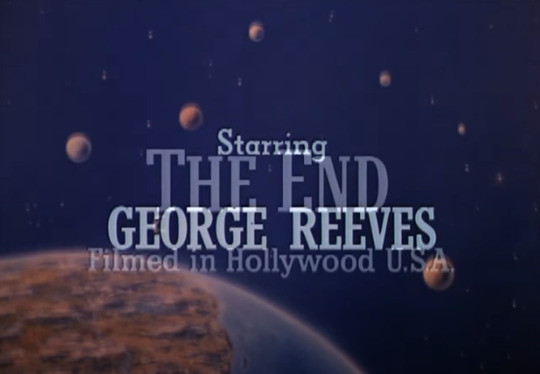
The final episode of the series was also Reeves’ final screen appearance. “All That Glitters” was also directed by Reeves, as were the previous two episodes.
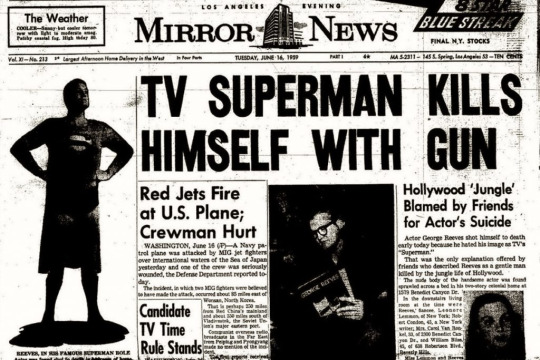
His death on June 16, 1959, from a gunshot remains a controversial subject; the official finding was suicide, but some believe that he was murdered or the victim of an accidental shooting. He was 45 years old.
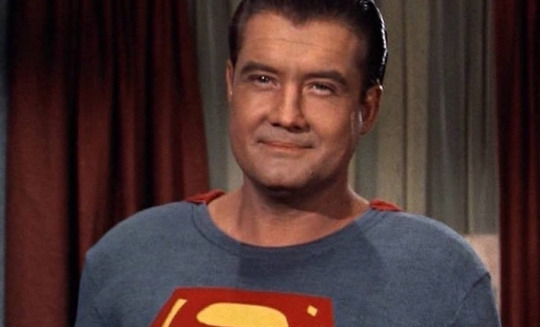
#George Reeves#I Love Lucy#Lucille Ball#Adventures of Superman#Clark Kent#Superman#TV#Keith Thibodeaux#Winged Victory#Moss Hart#Espionage Agent#Gone With the Wind
93 notes
·
View notes
Text
Early African-American Actors and the Oscars By Susan King

Hattie McDaniel was the first African-American performer to win an Oscar for Best Supporting Actress for GONE WITH THE WIND (’39). Dorothy Dandridge was the first African-American woman to receive a Best Actress nomination for CARMEN JONES (’54). And Sidney Poitier was the first to receive a lead actor nomination for THE DEFIANT ONES (’58) and to win for 1963’s LILIES OF THE FIELD.
But there were other pioneering African-American performers who earned Oscar nominations. And, in the case of one actor, actually received an honorary award before Poitier’s historic win.
James Baskett
Sidney Poitier was the first African-American to earn a competitive actor Oscar, but Baskett was the first to receive an Academy Award. In 1948, he received an honorary Oscar for his “able and heartwarming characterization of Uncle Remus in SONG OF THE SOUTH (’46), friend and storyteller to the children of the world.” Since Disney shelved the box-office hit that combined live action and animation in 1986 because of racial insensitivities (bootleg copies are available on eBay), the only bit of Baskett’s performance that one can see is the clip of him performing the Oscar-winning tune “Zip-a-Dee-Doo-Dah.”
Based on Joel Chandler Harris’ “Uncle Remus” stories featuring the adventures of Br’er Rabbit, Br’er Fox and Br’er Bear and set in a plantation post-Civil War, the film received mixed reviews at the time of its release. The NAACP and other African-American groups expressed outrage at the film with several picket lines set up in major cities, including Los Angeles where the National Negro Congress handed out pamphlets stating that the picture “contains dangerous stereotyping that creates an impression of Negros in the minds of their fellow Americans which make them appear to be second class citizens.”
SONG OF THE SOUTH was Baskett’s most high-profile role. He had appeared on Broadway in the legendary 1929 black musical revue Hot Chocolates. After moving to Los Angeles, he had appeared in such films as 1943’s REVENGE OF THE ZOMBIES and 1944’s THE HEAVENLY BODY. From 1944-48, he appeared as Gabby Gibson in the radio show Amos n Andy.
He had initially auditioned for the voice of Br’er Fox, but Walt Disney was so impressed that he hired him to play the cartoon character as well as Remus. Baskett never got to see if the award would have changed his career. Just four months after winning the Oscar, Baskett, who had suffered from diabetes, died of heart failure at the age of 44.

Ethel Waters
After World War II, Hollywood studios started making films examining serious topics. In 1947, 20th Century-Fox released GENTLEMAN’S AGREEMENT, which explored anti-Semitism. The film, directed by Elia Kazan, won three Oscars including Best Film and Director. Two years later, Fox took on racism with PINKY (’49), also directed by Kazan. Based on the novel Quality by Cid Ricketts Sumner, PINKY revolved around Patricia “Pinky,” a light-skinned Black woman (Jeanne Crain) who passes for white—she even has a white fiancée (William Lundigan)—in the North before returning home to the South to visit her beloved grandmother, Dicey (Waters).
Waters, the legendary singer who made her film debut in the 1929 musical ON WITH THE SHOW!, earned an Oscar nomination for Supporting Actress for her warm performance as Dicey. She then went on to star opposite Julie Harris on in THE MEMBER OF THE WEDDING (’52), first on Broadway then in the film adaption. She also starred in the TV sitcom Beulah from 1950-52. Her final film was 1959’s THE SOUND AND THE FURY and she guest starred in several TV series before dying in 1977 at the age of 80.

Juanita Moore
The singer/dancer/actress, who began her career in the chorus of the Cotton Club, was the third African-American actress to receive a Best Supporting Actress nomination for the 1959 melodrama IMITATION OF LIFE. Directed by Douglas Sirk and produced by Ross Hunter, the hit adaptation of Fannie Hurst’s 1933 novel starred Lana Turner as an ambitious actress and single mother to a teenager daughter (Sandra Dee.) Moore is her loving maid Annie who discovers her light-skinned daughter (Oscar-nominated Susan Kohner) is attempting to pass as white.
Moore, who made her film debut in the late 1930s, had played bits, uncredited parts and supporting roles in films until she was cast as Annie Johnson. The gracious actress told me in a 2009 Los Angeles Times interview that many actresses wanted the role, including Pearl Bailey. Universal didn’t want [Moore]. “They wanted everybody but me,” she confessed to me. “Only the director and [producer] Ross Hunter [wanted me].” Despite the Oscar nomination, Moore didn’t work for an entire year after. She told the L.A. Times in 1967 that the nomination was a mixed blessing.
“The Oscar prestige was fine, but I worked more before I was nominated. Casting directors think an Oscar nominee is suddenly in another category. They couldn’t possibly ask you to do one or two-days’ work. You wouldn’t accept it. And I’m sure I would.” She was 99 when she died in 2014.

Rupert Crosse
Fifty years ago, Crosse became the first African-American to receive a Best Supporting Actor nomination for the picaresque comedy-drama THE REIVERS (‘69), based on William Faulkner’s final novel. Set in the South in 1912, the film revolves around a trip in a fancy Winton Flyer car organized by a wealthy family’s hired hand (Steve McQueen). Joining him is the patriarch’s 12-year-old grandson (Mitch Vogel) and the family’s mixed race second cousin (Crosse).
Crosse, who was a life member of the Actors Studio, appeared in two of John Cassavetes’ films, 1958’s SHADOWS and 1961’s TOO LATE BLUES. However, THE REIVERS wasn’t a box-office hit and Crosse’s career did not get a boost from the Oscar nomination. He continued to work primarily in television. His last role was in the 1971-72 NBC comedy series The Partners, in which he and Don Adams played bumbling detectives. Crosse had been cast to star opposite his good friend Jack Nicholson and Randy Quaid in Hal Ashby’s 1973 classic The Last Detail but had to pull out of the project when he learned he had terminal cancer. He was just 45 when he died in 1973.
#Black actors#African American actors#Oscars#Academy Awards#Ethel Waters#Juanita Moore#James Baskett#Rupert Crosse#TCM#Turner Classic Movies#Susan King
207 notes
·
View notes
Text
Ethel Waters (October 31, 1896 – September 1, 1977) was an American blues, jazz and gospel singer and actress.
She frequently performed jazz, big band, and pop music, on the Broadway stage and in concerts, but she began her career in the 1920s singing blues.
Her best-known recordings include "Dinah," "Stormy Weather," "Taking a Chance on Love," "Heat Wave," "Supper Time," "Am I Blue?" and "Cabin in the Sky," as well as her version of the spiritual "His Eye Is on the Sparrow." Waters was the second African American, after Hattie McDaniel, to be nominated for an Academy Award. She was also the first African-American woman to be nominated for an Emmy Award, in 1962.
Waters was born in Chester, Pennsylvania, on October 31, 1896, as a result of the rape of her teenaged mother, Louise Anderson (believed to have been 13 years old at the time, although some sources indicate she may have been slightly older), by John Waters, a pianist and family acquaintance from a mixed-race middle-class background. He played no role in raising Ethel. Soon after she was born, her mother married railroad worker Norman Howard. Ethel used the surname Howard as a child, before reverting to her father's name of Waters. She was raised in poverty and never lived in the same place for more than 15 months. She said of her difficult childhood, "I never was a child. I never was cuddled, or liked, or understood by my family."
Waters grew tall, standing 5' 9½" in her teens. According to women-in-jazz historian and archivist Rosetta Reitz, Waters's birth in the North and her peripatetic life exposed her to many cultures.
Waters married at the age of 13, but her husband was abusive, and she soon left the marriage and became a maid in a Philadelphia hotel, working for $4.75 per week. On her 17th birthday, she attended a costume party at a nightclub on Juniper Street. She was persuaded to sing two songs and impressed the audience so much that she was offered professional work at the Lincoln Theatre in Baltimore. She later recalled that she earned the rich sum of ten dollars a week, but her managers cheated her out of the tips her admirers threw on the stage.
After her start in Baltimore, Waters toured on the black vaudeville circuit. As she described it later, "I used to work from nine until unconscious." Despite her early success, she fell on hard times and joined a carnival, traveling in freight cars along the carnival circuit and eventually reaching Chicago. Waters enjoyed her time with the carnival and recalled, "the roustabouts and the concessionaires were the kind of people I'd grown up with, rough, tough, full of larceny towards strangers, but sentimental and loyal to their friends and co-workers." She did not last long with them, though, and soon headed south to Atlanta, where she worked in the same club with Bessie Smith. Smith demanded that Waters not compete in singing blues opposite her. Waters conceded and sang ballads and popular songs. Around 1919, Waters moved to Harlem and there became a celebrity performer in the Harlem Renaissance of the 1920s.
Waters obtained her first Harlem job at Edmond's Cellar, a club with a black patronage. She specialized in popular ballads and became an actress in a blackface comedy, Hello 1919. The jazz historian Rosetta Reitz pointed out that by the time Waters returned to Harlem in 1921, women blues singers were among the most powerful entertainers in the country. In 1921, Waters became the fifth black woman to make a record, on the tiny Cardinal Records label. She later joined Black Swan Records, where Fletcher Henderson was her accompanist. Waters later commented that Henderson tended to perform in a more classical style than she preferred, often lacking "the damn-it-to-hell bass."
She recorded with Black Swan from 1921 through 1923. In early 1924, Paramount bought the Black Swan label, and she stayed with Paramount through that year. She first recorded for Columbia Records in 1925, achieving a hit with "Dinah," which was voted a Grammy Hall of Fame Award in 1998. Soon after, she started working with Pearl Wright, and together they toured in the South. In 1924, Waters played at the Plantation Club on Broadway. She also toured with the Black Swan Dance Masters. With Earl Dancer, she joined what was called the "white time" Keith Vaudeville Circuit, a traditional white-audience based vaudeville circuit performing for white audiences and combined with screenings of silent movies. They received rave reviews in Chicago and earned the unheard of salary of US $1,250 in 1928. In 1929, Waters and Pearl Wright arranged the unreleased Harry Akst song "Am I Blue?," which then appeared in the movie On with the Show and became a hit and her signature song.
Although she was considered a blues singer during the pre-1925 period, Waters belonged to the vaudeville style of Mamie Smith, Viola McCoy, and Lucille Hegamin. While with Columbia, she introduced many popular standards, including "Dinah," "Heebie Jeebies," "Sweet Georgia Brown," "Someday, Sweetheart," "Am I Blue?" and "(What Did I Do to Be So) Black and Blue" on the popular series, while she continued to sing blues ("West End Blues," "Organ Grinder Blues," etc.) on Columbia's 14000 race series. During the 1920s, Waters performed and was recorded with the ensembles of Will Marion Cook and Lovie Austin. As her career continued, she evolved toward being a blues and Broadway singer, performing with artists such as Duke Ellington. She remained with Columbia through 1931. She signed with Brunswick Records in 1932 and remained until 1933, when she went back to Columbia. She signed with Decca Records in late 1934 for only two sessions, as well as a single session in early 1938. She recorded for the specialty label Liberty Music Shop Records in 1935 and again in 1940. In 1938 and 1939, she recorded for Bluebird.
In 1933, Waters appeared a satirical all-black film, Rufus Jones for President, which featured the child performer Sammy Davis Jr. as Rufus Jones. She went on to star at the Cotton Club, where, according to her autobiography, she "sang 'Stormy Weather' from the depths of the private hell in which I was being crushed and suffocated." She had a featured role in the wildly successful Irving Berlin Broadway musical revue As Thousands Cheer in 1933, in which she was the first black woman in an otherwise white show. She had three gigs at this point; in addition to the show, she starred in a national radio program and continued to work in nightclubs. She was the highest-paid performer on Broadway at that time. MGM hired Lena Horne as the ingenue in the all-black musical Cabin in the Sky, and Waters starred as Petunia in 1942, reprising her stage role of 1940. The film, directed by Vincente Minnelli, was a success.
She began to work with Fletcher Henderson again in the late 1940s. She was nominated for an Academy Award for Best Supporting Actress for the film Pinky (1949), under the direction of Elia Kazan, after the original director, John Ford, quit over disagreements with Waters. According to producer Darryl F. Zanuck, Ford "hated that old...woman (Waters)." Ford, Kazan stated, "didn't know how to reach Ethel Waters." Kazan later referred to Waters's "truly odd combination of old-time religiosity and free-flowing hatred.". In 1950, she won the New York Drama Critics Circle Award for her performance opposite Julie Harris in the play The Member of the Wedding. Waters and Harris reprised their roles in the 1952 film version, Member of the Wedding. In 1950, Waters starred in the television series Beulah, becoming the first African-American actress to have a lead role in a television series. However, she quit after complaining that the portrayal of blacks was "degrading." She later guest-starred in 1957 and 1959 on NBC's The Ford Show, Starring Tennessee Ernie Ford. In the 1957 episode, she sang "Cabin in the Sky".
Despite these successes, her brilliant career was fading. She lost tens of thousands in jewelry and cash in a robbery, and she had difficulties with the IRS. Her health suffered, and she worked only sporadically in the following years. In 1950–51 she wrote her autobiography His Eye Is on the Sparrow with Charles Samuels, in which she wrote candidly about her life. She explained why her age had often been misstated: her friends had to sign a paper claiming Waters was four years younger than she was to get a group insurance deal; she stated that she was born in 1900. His Eye Is on the Sparrow was adapted for a stage production in which she was portrayed by Ernestine Jackson. In her second autobiography, To Me, It's Wonderful, Waters stated that she was born in 1896. Rosetta Reitz called Waters "a natural ... [Her] songs are enriching, nourishing. You will want to play them over and over again, idling in their warmth and swing. Though many of them are more than 50 years old, the music and the feeling are still there."
Waters had romantic relationships with women as well as men.
In her later years, she often toured with Billy Graham on his crusades.
Waters died on September 1, 1977, aged 80, from uterine cancer, kidney failure, and other ailments, in Chatsworth, California.
She was the great-aunt of the singer-songwriter Crystal Waters.
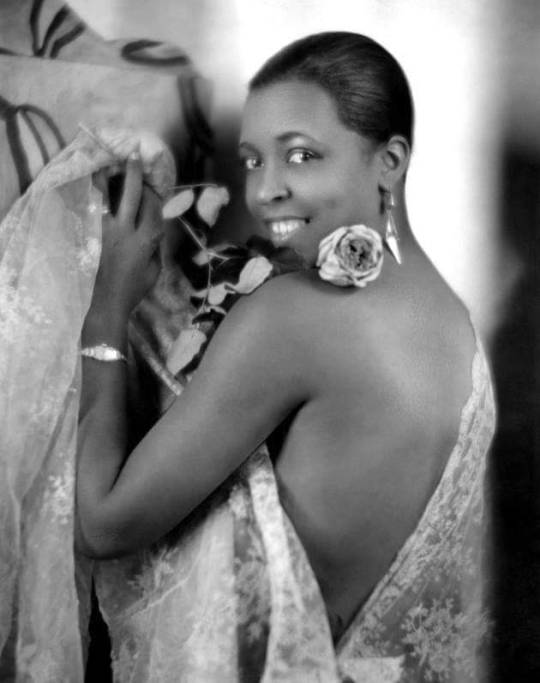
7 notes
·
View notes
Text
Jack Kelly: We have had a lot of people come through our doors over the past 11 years at Tin Pan Alley. Last night is one to remember for life. After Darren Criss did a two hour show at town hall last night. Over an hour with the folks that paid for a meet and greet with him. He came to Tin Pan Alley and asked “ can I play a set when the piano player is finished“ He played a full hour. Don’t get me going on his wife Mia Criss. Two of the kindest humble people. Thank you both. Can’t wait to see you again soon.
#darren criss#jack kelly#mia swier#john mcdaniel's broadway series#darren criss with john mcdaniel#darren criss with john mcdaniel after party#instagram#video#july 2024
63 notes
·
View notes
Text




DARREN & MIA CRISS - ♪ Defying Gravity | Darren Criss with John McDaniel After Party at Tin Pan Alley Provincetown | July 21, 2024 | 🎥 Ken Pratt
#darren criss#mia swier#john mcdaniel's broadway series#darren criss with john mcdaniel#darren criss with john mcdaniel after party#kiss#my gifs#dc gifs
73 notes
·
View notes
Text
Source: ♡ Download: ♡
#darren criss#john mcdaniel#john mcdaniel's broadway series#darren @ provincetown town hall#chess the musical#audio#musicdaily#please do not repost
17 notes
·
View notes
Text
jeffrey.heckman: As always, this man does not disappoint! #darrencriss #provincetown
#darren criss#john mcdaniel's broadway series#darren criss with john mcdaniel#instagram#video#july 2024
62 notes
·
View notes
Text
tin.pan: 525,600 minutes: approximately how many minutes @ darrencriss performed this weekend
We have had a lot of performers come through our doors over the past 11 years but Sunday was one for the history books! After Darren Criss did a two hour show at Town Hall with @ johnmcd123 , and an hour long VIP meet and greet, he came to Tin Pan Alley and asked to play a set at our piano bar! He played for an hour and continued to share his talent to whoever walked in the door!
Thank you so much, Darren, for visiting us and spreading your love to our community! You are welcome at TPAs piano anytime! . #DarrenCriss #DarrenCrissLive #DarrenCrissConcert #Gleeks #BroadwayStar #PTownMusic #LiveInPTown #ConcertInCapeCod #PTownEntertainment #CapeCodConcerts #LiveMusic #PTownNightlife #BroadwayFans #SummerInPTown #PTownEvents #CapeCodSummer #MustSeeEvent #PTown2024 #CapeCodLife #MusicLovers #ConcertTickets #LivePerformance #DarrenCrissFans #CapeCodNightlife #PTownExperience #DontMissOut #GleeFans #JohnMcDanielsConcertSeries #PTown2024 #DarrenCrissCapeCod
#darren criss#tin pan alley#mia swier#michael samonte#john mcdaniel's broadway series#darren criss with john mcdaniel#darren criss with john mcdaniel after party#instagram#video#july 2024
36 notes
·
View notes
Text
kevinmichaelboo x : @ darrencriss
#darren criss#john mcdaniel's broadway series#darren criss with john mcdaniel#instagram#video#july 2024
40 notes
·
View notes
Text
Ken Pratt: It was a weekend filled with some pretty big names in Provincetown. Kamala Harris, Pete Buttigieg, Gov. Maura Healey, Jamie Raskin, Jennifer Coolidge, Billy Porter and many others were here for a fundraiser up at the monument. I got to see Broadway star Alice Ripley perform a show at the Post Office Cabaret. Last evening we were at Tin Pan Alley. The piano player had finished his set about midnight. All of a sudden another gentleman got behind the piano and started playing. It was Darren Criss who had just done a sold out show at Town Hall. He is an Emmy and Golden Globe winner that starred for 5 seasons on Glee and has done many movies and Broadway shows as well. The place filled back up to capacity as the word spread and he played for about 45 minutes. It was a spontaneous, magical Provincetown moment. Here is one of the clips I recorded….
#darren criss#mia swier#john mcdaniel's broadway series#darren criss with john mcdaniel#darren criss with john mcdaniel after party#facebook#video#july 2024
44 notes
·
View notes